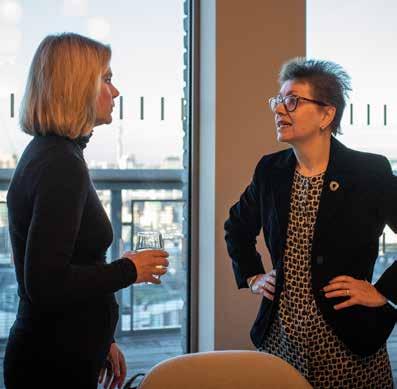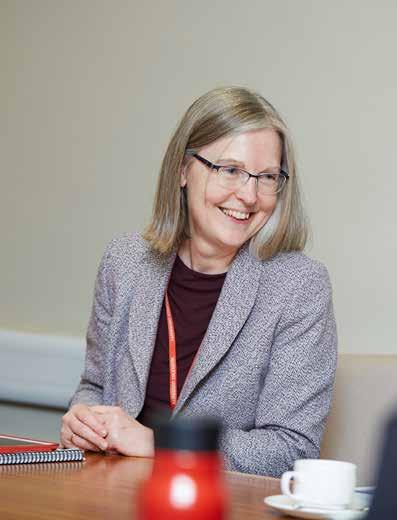
9 minute read
BREAKING THE MOULD


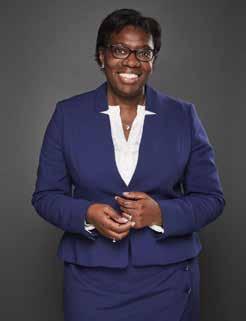
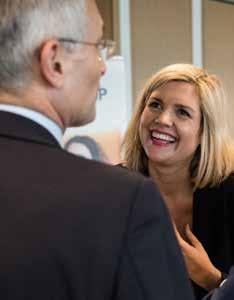
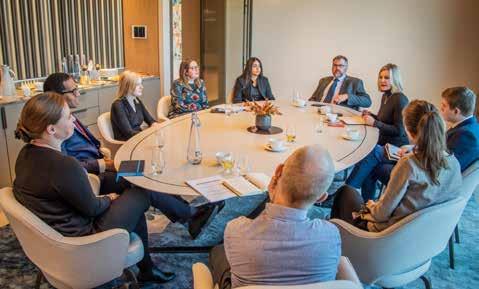
A new age of collaboration between business and the community SPOTLIGHT ON SANDRA WALLACE AND DLA PIPER
SANDRA WALLACE IS DLA PIPER’S JOINT MANAGING DIRECTOR (EUROPE) AND INTERIM CHAIR OF THE SOCIAL MOBILITY COMMISSION. SHE HERSELF ACHIEVED SOCIAL MOBILITY IN FORGING A HUGELY SUCCESSFUL CAREER IN LAW AND HAS GONE ON TO HELP OTHERS DO THE SAME BY SHAPING DLA’S SOCIAL MOBILITY APPROACH AND THROUGH HER WORK WITH THE COMMISSION. HERE SHE TALKS TO JUSTINE GREENING ABOUT THE LONG-TERM CHANGES REQUIRED IN BUSINESS IN THE CONTEXT OF A DIFFICULT 2020.
QJG// As a law firm, social mobility is at the heart of what DLA is all about. How does that fit in the context of COVID-19 and its potential impact in widening the opportunity gap in the UK in the long term?
ASW// The crisis has really brought home to everyone at DLA how much more we have to look at the home environment. It’s opening our eyes to the whole life cycle of the opportunities we need to provide to people. They can come into our offices and we can show them what it’s like to be a lawyer and give them access to our programmes while they’re in our offices, but we have to think what more can we be doing and what more should business generally be doing to address some of the challenges that this crisis has brought out. For example, with some of the IT that we have taken for granted as individuals, should we be saying as a business, when you have equipment you no longer use, could that be used in our outreach programme? Should we be up-skilling our lawyers to understand home learning [so that] we can talk students through how they can best motivate and prepare themselves when they are not in a school environment? It’s about looking at all those things that really come to the fore now rather than just the things we provide when it’s business as usual.
Q// Some of the programmes that DLA has done very successfully are in schools but if young people are out of school or more of the learning they do might be online, including when they get to university, it means you then have to rethink your approach to have the same level of impact.
A// Absolutely and we have to put ourselves in their shoes and think, ‘let’s not take things for granted that we assume are available’. This is a rethink that’s going to happen in our
You’ve got to put your money and time where “ business now along with the support that we’re already doing. your mouth is and A// Yes and that means people are not forced to move to get The circumstances have forced us to focus on what’s an experience like make sure your access to those facilities. The more local these facilities are to people, for people in lower socio-economic backgrounds and what support can business is making the more likely they can still rely on their families and their support we give that might help them, not just when they’re in front of us in our that conducive networks and still have access to opportunities. So I absolutely think premises or in school. that’s a partnership that we need to Q// The impact of the quality of the home environment can extend into the early years of careers. So if you’re training to Q// Looking back on your career to date, what advice be a lawyer but your home environment isn’t conducive - and would you give your younger self about whether a career in you’re at a law firm that shifts to home working because its law is good for you? more cost effective - it could mean that you’re less able to shine and progress than, perhaps, someone with a bigger A// You have to be really resilient. There will always be house, better facilities and more peace and quiet. people who tell you ‘that’s not possible’, or ‘it isn’t for people A// That’s right. [The situation] makes you look into your going to be successful straight away. I would say to my communities and what’s out there, what’s available, what are younger self you have to try to work on that but then we supporting and how are we working with local authorities resilience is different to confidence so I would also say be and local enterprise partnerships to ensure there are facilities confident and don’t make assumptions about what you can or an environment outside the home that still means [people] or can’t achieve. can access things and still shine. If [the crisis] changes the way of working for a law firm going forward, we’ve got to Q// And in your career you’ve been able to shape the look at what that means for everybody and not just the company to make the career path for people coming from assumptions that we might make about the facilities and disadvantaged backgrounds smoother with fewer barriers. technology we assume everybody will have. So I think there explore a bit more than we have done so far. like you’. You’ve got to appreciate that not everything is will have to be more collaboration with our communities and A// Yes, it took me a while to realise that I had an local authorities in order that businesses have both bases obligation. You realise that you’ve been given these amazing covered. opportunities. You now have your own access to amazing opportunities and you’ve got to let people know what is out Q// So you end up with a new relationship between there. Then you’ve got to put your money and time where companies and local councils or the government where both your mouth is and make sure your business is making that sides are trying to work out how they can help one another; conducive. We can’t do everything as one business but as a recognising that employees are part of two communities - legal sector, if we get together more and work collaboratively where they work and where they live. together which we are doing, then that is really powerful.
DLA PIPER
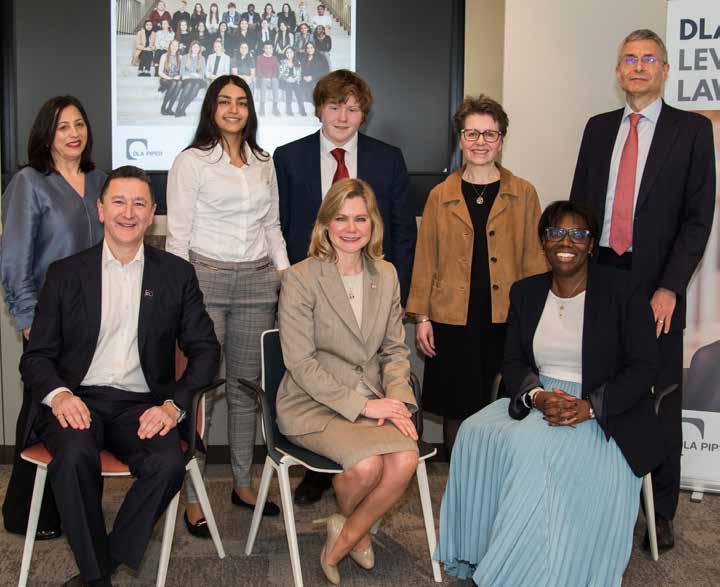
LEVELLING UP LAW
DLA PIPER IS A GLOBAL LAW FIRM WITH OFFICES IN OVER 40 COUNTRIES ACROSS THE AMERICAS, EUROPE, THE MIDDLE EAST, AFRICA AND ASIA PACIFIC. SOCIAL MOBILITY-DRIVEN PRACTICES ARE INGRAINED IN THE BUSINESS, WITH A RECOGNITION OF THE NEED TO FIND AND NURTURE TALENT FROM THE WIDEST POOL OF CANDIDATES POSSIBLE.
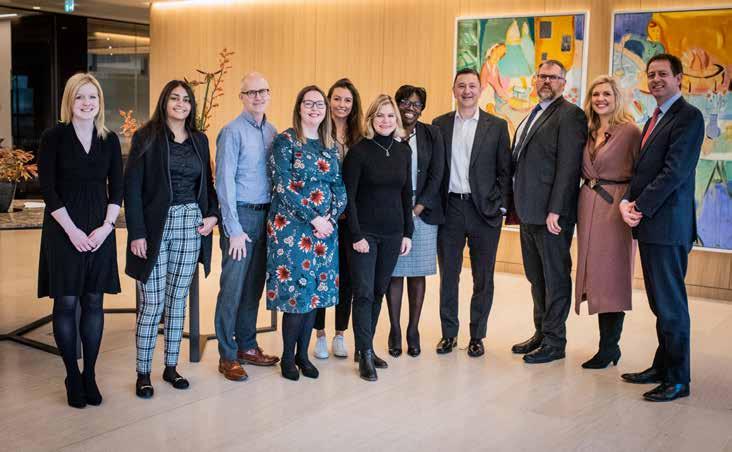
Although officially formed in a 2005 merger between US- and UK- based firms, DLA Piper’s origins can be traced back to 19th-century Yorkshire. The firm’s focus on social mobility is an integral factor in its continued growth and development. Both in the UK and internationally, social mobility-driven policies and practices are ingrained in the business, with a recognition of the need to find and nurture talent from the widest pool of candidates possible. Law is too often not the first choice of career for people from lower socioeconomic backgrounds. But DLA Piper is leading on long-term and impact-driven access programmes to change this, having been at the forefront of industry-wide improvements in recent years. It is working hard to support people from less privileged backgrounds who might not otherwise have considered a career in law. Its participation in PRIME, for example, demonstrates a drive to collaborate with peers and measure the effectiveness and success of current programmes. The firm is a founding member of the PRIME Commitment, an alliance of over 70 UK law firms committed to improving access to the legal profession through quality work experience for those from lower socioeconomic backgrounds. Its Head Start programme, meanwhile, is market-leading and impact-driven, supporting young people in reaching their full potential. It eases the path of people from under-represented groups into the legal profession, and helps them overcome barriers that might prevent them progressing into the law and succeeding in their careers. It sees DLA Piper work with each student for three years, providing financial assistance and a tailored course of mentoring, training and internships. This approach develops the participant’s skills, confidence and networks. After completion, students are linked to the firm’s global graduate recruitment programme and are encouraged to pursue the right opportunities for them. Through the firm’s open days and Insight Programme, DLA Piper is further increasing accessibility for young people and helping raise

their aspirations. The Insight Programme offers a look at life at a global business law firm. Delegates can hear from the firm’s senior leaders, participate in professional skills training, gain insights on practice groups and attend networking events. The programme is aimed at first-year law students or penultimateyear non-law students. Open days provide insight into life as a lawyer in a global law firm, information for those wishing to apply for an Insight Programme or summer internship, and an opportunity to meet people at the firm. Students from any year group or degree discipline may apply for the open days, which are held in each of the firm’s UK locations. Work placements, including summer internships, offer the opportunity to develop valuable workplace skills and networks. Recruitment practices are, of course, a pivotal factor in improving social mobility, and recruitment is often where people’s social mobility journeys begin. DLA Piper has committed to ensuring transparency and fairness in its recruitment practices, resulting in a level playing field of competition for both internships and careers with the firm. These fair practices have been demonstrated through the adoption of contextual recruitment, and the active recognition of candidates who have faced significant challenges in life. Assessors review candidates’ achievements in the context of their starting points in life and the barriers they might have faced as a result. The firm has also removed minimum academic entry requirements for graduates, which helps to assess a candidate’s true potential. It has also moved from a competencies-based model focused on traditional indicators of talent, such as university performance, to a strengths-based model that considers each individual’s aptitude and potential. This helps to reduce unconscious bias and “pastfocus” questioning that favours candidates from more privileged backgrounds. The removal of unfair barriers in the recruitment process also includes the eradication of legal jargon and needless procedural complexities that might disadvantage people in certain situations. This ensures that applicants are judged purely on their talent and potential to do the job, rather than their background or other factors beyond their control that are irrelevant to their suitability for the role. Company culture is a key factor in retaining people from lower socioeconomic backgrounds. Culture is hard to change, and is about more than just the intent to be a good and ethical business. Inclusiveness, diversity and a commitment to social mobility are woven into DLA Piper’s corporate values through partnerships, education, agile working and flexibility, and pipeline development. This creates a workplace where uniqueness is respected, valued and embraced. It is a place where people from disadvantaged backgrounds can see a path for progress that is clear of any unfairly placed barriers. DLA Piper recognises its responsibility as one of the world’s leading global law firms to have meaningful social impact. It has demonstrated leading practice in boosting social mobility in the legal sector, and is setting an example of how businesses can increase opportunities across all sectors.
